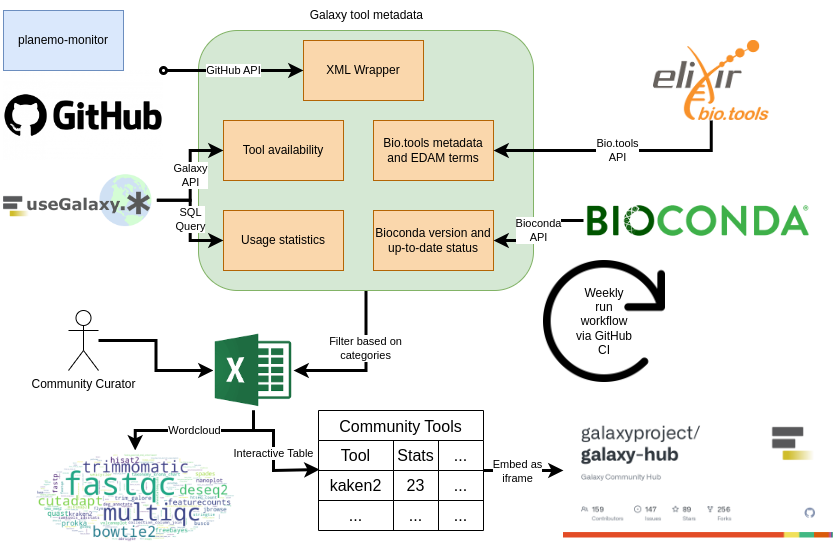Galaxy Communities Dock aka Galaxy Codex is a catalog of Galaxy resources (tools, training, workflows) that can be filtered for any community.
This repository stores the sources to build this catalog. The catalog is automatically updated every week.
The generated data of the catalog can be found in the dedicated results branch
Any Galaxy community can be added to this project and benefit from the dedicated resources, including interactive tables that can be embedded into subdomains and website via an iframe. Learn how to add your community in the dedicated GTN toturial.
-
Install virtualenv (if not already there)
$ python3 -m pip install --user virtualenv -
Create virtual environment
$ python3 -m venv env -
Activate virtual environment
$ source env/bin/activate -
Install requirements
$ python3 -m pip install -r requirements.txt
This tool automatically collects a table of all available Galaxy tool suites including their metadata. Therefore, various sources are parsed to collect the metadata, such as:
- GitHub (parsing each tool wrapper)
- bio.tools
- Bioconda
- Galaxy server (availability, statistics)
The created table can be filtered to only show the tools relevant for a specific community.
The tool table benefits from EDAM annotations of the tools, this requires, that the tools are annotation via bio.tools. Learn how to improve metadata for Galaxy tools using the bio.tools registry.
A GitHub action performs every week the following steps:
- Extract all tools by
- Parsing tool GitHub repository from Planemo monitor listed
- Checking in each repo, their
.shed.yamlfile and filter for categories, such as metagenomics - Extracting metadata from the
.shed.yaml - Extracting the requirements in the macros or xml to get version supported in Galaxy
- Checking available against conda version
- Extracting bio.tools information if available in the macros or xml
- Checking available on the 3 main galaxy instances (usegalaxy.eu, usegalaxy.org, usegalaxy.org.au)
- Getting usage statistics form usegalaxy.eu
- Create an interactive table for all tools: All tools
- Filter the tool suite per community
- Create an interactive table for all registered communities, e.g. microGalaxy
-
Get an API key (personal token) for GitHub
-
Export the GitHub API key as an environment variable:
$ export GITHUB_API_KEY=<your GitHub API key> -
Run the script to extract all tools
$ bash bin/extract_all_tools.sh
The script will generate a TSV file with each tool found in the list of GitHub repositories and metadata for these tools:
- Galaxy wrapper id
- Description
- bio.tool id
- bio.tool name
- bio.tool description
- EDAM operation
- EDAM topic
- Status
- Source
- ToolShed categories
- ToolShed id
- Galaxy wrapper owner
- Galaxy wrapper source
- Galaxy wrapper version
- Conda id
- Conda version
-
Run the extraction as explained before
-
(Optional) Create a text file with ToolShed categories for which tools need to be extracted: 1 ToolShed category per row (example for microbial data analysis)
-
(Optional) Create a TSV (tabular) file with tool status (1 tool suite per row) as 3 columns:
- ToolShed ids of tool suites (one per line)
- Boolean with True to keep and False to exclude
- Boolean with True if deprecated and False if not
-
Run the tool extractor script
$ python bin/extract_galaxy_tools.py \ filter \ --all <Path to JSON file with all extracted tools> \ --ts-filtered <Path to output TSV with tools filtered based on ToolShed category> --filtered <Path to output TSV with filtered tools based on ToolShed category and manual curation> \ [--categories <Path to ToolShed category file>] \ [--status <Path to a TSV file with tool status - 3 columns: ToolShed ids of tool suites, Boolean with True to keep and False to exclude, Boolean with True if deprecated and False if not>]
Materials are extracted from the Galaxy Training Network and extended with information from Plausible (visits), YouTube (views), feedback and tools.
A GitHub action performs every week the following steps:
- Extract all training by
- Parsing the GTN API
- Adding EDAM operations from the tools used in the tutorial
- Adding visit stats using the Plausible API
- Adding video view stats using YouTube API
- Adding feedback from the GTN API
- Create an interactive table for all tutorials
- Filter the training per community based on tags
- Create an interactive table for all registered communities
-
Get an API key (personal token) for Plausible
-
Export the Plausible API key as an environment variable:
$ export PLAUSIBLE_API_KEY=<your GitHub API key> -
Run the script
$ bash bin/extract_all_tutorials.sh
-
Run the extraction as explained before
-
Create a file named
tutorial_tagsin your communitydatafolder with the list of tutorial tags to keep -
Run the following command
$ python bin/extract_gtn_tutorials.py \ filter\ --all "results/all_tutorials.json" \ --filtered "results/<your community>/tutorials.tsv" \ --tags "data/communities/<your community>/tutorial_tags"
Example to generate a wordcloud for the Galaxy tool suites with size of names of tool suites depends on the number of tool users in 2022-2023 on usegalaxy.eu:
$ python bin/create_wordcloud.py \
--table "results/all_tools.tsv" \
--name_col "Galaxy wrapper id" \
--stat_col "No. of tool users (2022-2023) (usegalaxy.eu)" \
--wordcloud_mask "data/usage_stats/wordcloud_mask.png" \
--output "results/all_tools_wordcloud.png" \Example to generate an HTML file with an interactive table with microGalaxy tools that should be kept (True in To keep column)
$ python bin/create_interactive_table.py \
--table "results/microgalaxy/tools.tsv" \
--remove-col "Reviewed" \
--remove-col "To keep" \
--filter-col "To keep" \
--template "data/interactive_table_template.html" \
--output "results/microgalaxy/index.html"To make a test run of the tool to check its functionalities follow Usage to set-up the environnement and the API key, then run
-
Tool extraction
$ bash bin/extract_all_tools.sh testThis runs the tool, but only parses the test repository Galaxy-Tool-Metadata-Extractor-Test-Wrapper
-
Tool filter
$ bash bin/get_community_tools.sh test -
Create interactive table and wordcloud
$ bash bin/format_tools.sh
-
Tutorial extraction
$ bash bin/extract_all_tutorials.sh test -
Tutorial filtering
$ bash bin/get_community_tutorials.sh test

